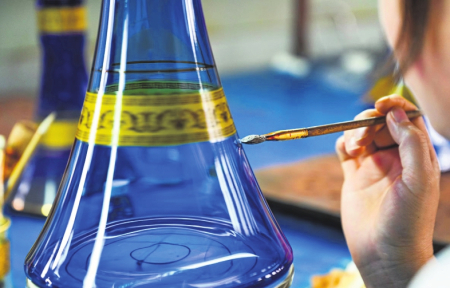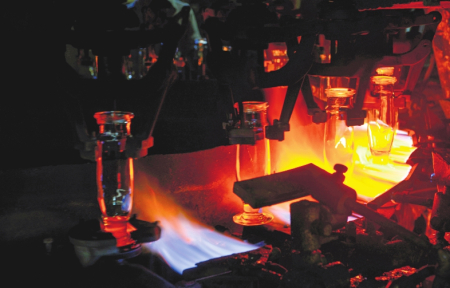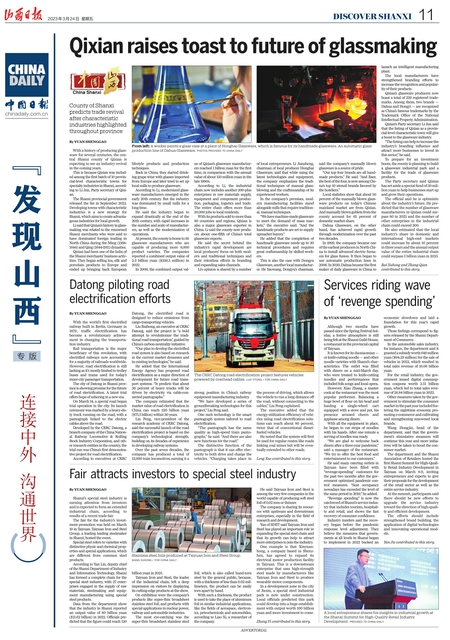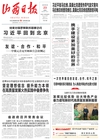Qixian raises toast to future of glassmaking

A worker paints a glass vase at a plant of Honghai Glassware, which is famous for its handmade glassware.

An automatic glass production line of Dahua Glassware. Photos provided to China Daily
With a history of producing glassware for several centuries, the central Shanxi county of Qixian is expecting to see an industry revival in the coming years.
This is because Qixian was included among the first batch of 10 provincial-level characteristic towns for specialty industries in Shanxi, according to Li Jun, Party secretary of Qixian.
The Shanxi provincial government released the list in September 2022. Developing towns with characteristic industries is a new strategy for Shanxi, which aims to create advantageous industries for local growth.
Li said that Qixian's history in glassmaking was related to the renowned Shanxi merchants who were said to have dominated foreign trade in North China during the Ming (1368-1644) and Qing (1644-1911) dynasties.
Qixian had been one of the hubs of the Shanxi merchants' business activities. They began selling tea, silk and porcelain products to Europe and ended up bringing back European lifestyle products and production techniques.
Back in China, they started drinking wine with glasses imported from Europe and later tried to set up local mills to produce glassware.
According to Li, modernized glassware manufacturers emerged in the early 20th century. But the industry was dominated by small mills for a long time.
He said the industry began to expand drastically at the end of the 20th century, with rapid increases in the number and scale of manufacturers, as well as the modernization of operations.
At present, the county is home to 50 glassware manufacturers who are capable of producing more 8,000 product varieties. The companies reported a combined output value of 2.3 billion yuan ($336.5 million) in 2022.
In 2006, the combined output value of Qixian's glassware manufacturers reached 1 billion yuan for the first time, in comparison with the annual value of about 150 million yuan in the late 1990s.
According to Li, the industrial chain now includes another 200-plus enterprises in raw materials supply, equipment and component production, packaging, logistics and trade. The entire chain offers more than 20,000 jobs to local residents.
With its products sold to more than 80 countries and regions, Qixian is also a major glassware exporter in China. Li said the county now produces about one-fifth of China's total glassware exports.
He said the secret behind the industry's rapid development are local producers' focus on both modern and traditional techniques and their relentless efforts in branding and expanding sales channels.
Li's opinion is shared by a number of local entrepreneurs. Li Jiansheng, chairman of local producer Honghai Glassware, said that while using the latest technologies and equipment, the company emphasizes the traditional techniques of manual glassblowing and the craftsmanship of its experienced workers.
In the company's premises, modern manufacturing facilities stand alongside mills that require traditional, manual techniques.
"We have machine-made glassware to meet the demand of mass markets," the executive said. "And the handmade products are set to supply upmarket buyers."
He added that the completion of handmade glassware needs up to 30 technical procedures and requires great craftsmanship by skilled workers.
This is also the case with Dongyu Glassware, another local manufacturer. He Yaowang, Dongyu's chairman, said the company's manually blown glassware is a source of pride.
"Our top four brands are all handmade products," He said. "And Baer, the best of the four, is now among China's top 10 utensil brands favored by hoteliers."
Local statistics show that about 50 percent of the manually blown glassware products on today's Chinese mainland market are from Qixian. And manually blown goblets from the county account for 65 percent of domestic market share.
Dahua Glassware, on the other hand, has achieved rapid growth through modernization over the past two decades.
In 1999, the company became one of the earliest producers in North China to install advanced electric furnaces for glass fusion. It then began to use automatic production lines in 2006. In 2020, Dahua became the first maker of daily glassware in China to launch an intelligent manufacturing plant.
The local manufacturers have strengthened branding efforts to increase the recognition and popularity of their products.
Qixian's glassware producers now boast a total of 229 registered trademarks. Of them, two brands — Dahua and Hongyi — are recognized as China's famous trademarks by the Trademark Office of the National Intellectual Property Administration.
Qixian's Party secretary Li Jun said that the listing of Qixian as a provincial-level characteristic town will give a boost to the glassware industry.
"The listing can help to increase the industry's branding influence and attract more businesses to invest in this sector," he said.
To prepare for an investment boom, the county is planning to build a glassware industrial park and a facility for the trade in glassware products.
The Party secretary said Qixian has set aside a special fund of 50 million yuan to help businesses start up and grow their operations.
The official said he is optimistic about the industry's future. He predicted that the number of glassware manufacturers in Qixian could surpass 80 in 2025 and the number of other enterprises in the industrial chain could exceed 300.
He also estimated that the local industry's share in domestic and international high-end markets could increase by about 10 percent in three years and the annual output value of the entire industrial chain could surpass 5 billion yuan in 2025.
By Yuan Shenggao
Bai Xuhong and Zhang Qian contributed to this story.











